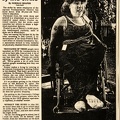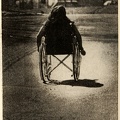Rocky Mountain News 6/30/77
[This text contains the story that appears in ADAPT 67 and ADAPT 72, but the entire text is included here for easier reading.]
PHOTO (News Photo): In darkened doorway a young woman in a wheelchair (Debby Tracy) appears light against the background, almost like she is glowing. She is a in a motorized wheelchair, the armrests come almost up to her arm pits. Her legs are turned to one side and her feet don't meet the footrests. She is looking up a bit and smiling a big smile; her long delicate fingers play around her control box (for her chair) and her other armrest.
Caption reads: Debbie Tracy at home: "I want to go back to school. I like it there."
[Headline] Debbie Tracy fighting to acquire knowledge
By Sue Lindsay Roll
Two years ago Debbie Tracy couldn't tell time. Today she reads the newspaper every morning. Her IQ has increased by 45 points.
The source of her improvement was two years in a Denver public school specializing in special education.
But Debbie, who was born with cerebral palsy and spent most of her life in institutions for the disabled, is 21 now and Denver school officials say she's too old to remain in public schools. They cite a state law saying the school district is required to educate children only up to age 20.
Forty wheelchair-bound young adults converged in front of the school administration building at 900 Grant St. Wednesday to demonstrate their support for Debbie’s right to more education in Denver public schools.
Debbie's mother, Elaine Jacoby. says she'll go to court if necessary to fight what she sees as a violation of her daughter's civil rights. She threatened to sue the Denver Board of Education, the state Institutions Department and the State Home and Training School in Wheat Ridge, where Debbie lived for nine years, for misdiagnosing her daughter's mental capacity and depriving her of an education.
DEBBIE SEES HER PLIGHT more simply. "I want in go back to school,“she said. "l like it there. I've been learning all kinds of things I didn't know before." Supporting Mrs. Jacoby and Debbie in their fight in the Atlantis Community, an organization which works to remove the severely disabled from institutions and place in jobs and apartments throughout the community. "Debbie is an adult who has been deprived access to the education that would give her the skills she needs to be independent," said Mrs Jacoby, who is divorced from Debbie's father. “l am not asking the taxpayers to finance her until she is prepared for college. But I feel that the Denver public schools owe Debbie more than two years of very basic education before they throw her out into society. I fail to see why my child should be denied what every other child has simply because she is not able-bodied."
Mrs. Jacoby said Debbie is a victim of the state's failure to meet the needs of handicapped children.
She said Debbie was prohibited from attending public schools and even special education schools because cerebral palsy, a disorder which affects the muscles, had left her without bladder control. For five years, Mrs. Jacoby said she repeatedly tried to get Debbie into public schools.
DEBBIE ATTENDED THE United Cerebral Palsy Center for five years. But Mrs. Jacoby said the training there was at pre-school level, directed toward a future in a sheltered workshop. "This was not an acceptable goal for my daughter," Mrs. Jacoby said.
During this period, numerous psychological tests were conducted. When Debbie was 10, her mother placed her at Ridge Home. "I thought she would receive educational and social programming that was adequate, but I found again that programs available to able-bodied children," she said.
When Debbie turned 19, things began looking up. The state passed the Handicapped Children's Act which, since 1975, has required public schools to provide education for handicapped and disabled persons aged 5 through 20.
Debbie moved out of Ridge to the Atlantis Community at 2965 W. 11th Ave. and entered Boettcher Elementary School, a special education facility within the Denver school system.
Her progress was remarkable. "When we got her from the Ridge she didn't know her alphabet, she didn't know her colors, she couldn't tell time," said Wade Blank, an executive director of the Atlantis Community.
"Now she’s alert and able and eager to learn. She reads the Rocky Mountain News. Debbie had an IQ of 50 when she got out of Ridge. Two years later her IQ is 95. That says a lot to us.”
She now functions at the level of a third or fourth grader, according to Blank. “We know she would be a normal functioning adult if only she
had been given the opportunity to develop," he said. “Instead, the state shoves everyone into state homes where they vegetate just because they happen to be confined to wheelchairs. It has nothing to do with actual mental ability. "
But Debbie is now 21. She has been told that she can no longer attend Boettcher or any other Denver public school.
Mrs. Jacoby has appealed this decision to everyone from the Boettcher school principal to Supt. Joseph Brzeinski.
LAST WEEK MRS. JACOBY received a letter containing the school officials’ final decision. Debbie could not be allowed to continue to attend Boettcher.
But the letter, from James M. O'Hara, executive director of the Department of Pupil Services, suggested that other alternatives existed
for Debbie at the Cerebral Palsy Center,the Emily Griffith Opportunity School and at private community agencies.
"None of these alternatives are adequate". Mrs. Jacoby said Wednesday in front of the board's headquarters. "They do not meet Debbie's needs. Debbie is not ready for the Opportunity School, but she needs more than the Cerebral Palsy Center can offer.
“For 21 years, I’ve put up with empty answers from school officials. I’ve talked and talked to people whose minds are already made up. They aren’t used to persons like Debbie living independently. They're used to them being institutionalized. Debbie can do better than that and I want her to have that chance.”
- Created on
- Wednesday 10 July 2013
- Posted on
- Monday 29 February 2016
- Tags
- Atlantis Community, bladder control, civil rights, Debbie Tracy, education, institutionalization, public schools, sheltered workshop, special ed, State Home and Training School, UCP
- Visits
- 1984
- Rating score
- no rate
- Rate this photo


0 comments